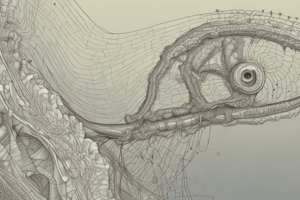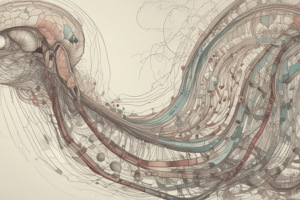Podcast
Questions and Answers
What is the term for the process by which a single individual produces offspring that are genetically identical to the parent?
What is the term for the process by which a single individual produces offspring that are genetically identical to the parent?
- Semelparous
- External fertilization
- Hermaphroditism
- Asexual reproduction (correct)
What is the term for organisms that have both male and female reproductive organs?
What is the term for organisms that have both male and female reproductive organs?
- Semelparous
- Dioecious
- Hermaphroditic (correct)
- Gonochoristic
What is the term for the process by which an organism reproduces only once in its lifetime?
What is the term for the process by which an organism reproduces only once in its lifetime?
- Semelparity (correct)
- Iteroparity
- Asexual reproduction
- External fertilization
What is the term for the process by which gametes are released into the environment, and fertilization occurs outside the body?
What is the term for the process by which gametes are released into the environment, and fertilization occurs outside the body?
What is the term for the process by which the sperm fertilizes the egg within the female reproductive tract?
What is the term for the process by which the sperm fertilizes the egg within the female reproductive tract?
What is the term for the process by which the fertilized egg develops into tissues?
What is the term for the process by which the fertilized egg develops into tissues?
What is the primary advantage of asexual reproduction?
What is the primary advantage of asexual reproduction?
In humans, which hormone plays a crucial role in regulating sperm development?
In humans, which hormone plays a crucial role in regulating sperm development?
What is the function of the seminiferous tubules in the male reproductive system?
What is the function of the seminiferous tubules in the male reproductive system?
Which of the following is an example of environmental sex determination?
Which of the following is an example of environmental sex determination?
What is the function of the fimbriae in the female reproductive system?
What is the function of the fimbriae in the female reproductive system?
Which of the following is a characteristic of internal fertilization?
Which of the following is a characteristic of internal fertilization?
What is the role of the bulbourethral gland in the male reproductive system?
What is the role of the bulbourethral gland in the male reproductive system?
Which of the following hormones influences egg development in the female reproductive system?
Which of the following hormones influences egg development in the female reproductive system?
What is the term for the process by which the fertilized egg undergoes a series of cellular divisions and differentiation to form tissues?
What is the term for the process by which the fertilized egg undergoes a series of cellular divisions and differentiation to form tissues?
What is the function of the Sertoli cells in the male reproductive system?
What is the function of the Sertoli cells in the male reproductive system?
Flashcards are hidden until you start studying
Study Notes
Modes of Asexual Reproduction
- Binary fission: single-celled organisms divide into two identical daughter cells
- Budding: a new individual grows from a parental organism
- Fragmentation: an organism breaks into smaller pieces, each developing into a new individual
- Regeneration: lost or damaged body parts grow back
Advantages and Disadvantages of Asexual and Sexual Reproduction
- Asexual reproduction: rapid population growth, identical offspring, but susceptible to disease and lack genetic variation
- Sexual reproduction: increased genetic variation, but slower population growth and complex process
Hermaphroditism
- An organism that produces both sperm and eggs, self-fertilization possible
Sex Determination
- Humans: determined by presence of X and Y chromosomes (XY for males, XX for females)
- Birds: determined by presence of Z and W chromosomes (ZZ for males, ZW for females)
Environmental Sex Determination
- Temperature-dependent sex determination in turtles and crocodiles
- Social sex determination in some fish and frogs
Semelparous
- Organisms that die after a single reproductive event, e.g., salmon and some insects
External Fertilization
- Occurs outside the body, e.g., fish, amphibians, and some invertebrates
- Examples: coral reefs, sea urchins, and some species of fish
Internal Fertilization
- Occurs inside the body, e.g., humans, mammals, and some invertebrates
- Examples: placental mammals, some species of fish, and some invertebrates
Human Egg Protection and Sperm Penetration
- Egg protection: corona radiata, zona pellucida, and cumulus oophorus
- Sperm penetration: through the corona radiata and zona pellucida
Fertilized Egg Development
- Stages: zygote, morula, blastula, gastrula
- Layers of tissue: ectoderm, endoderm, and mesoderm
Gastrulation
- The process of forming the three primary layers of tissue: ectoderm, endoderm, and mesoderm
Tissue Development
- Ectoderm: nervous system, skin, and senses
- Endoderm: digestive system and respiratory system
- Mesoderm: muscles, bones, and circulatory system
Male Reproductive System
- Penis: delivers semen during ejaculation
- Scrotum: protects and regulates temperature of testes
- Testes: produce sperm
- Semen: seminal fluid containing sperm
- Seminiferous tubules: site of sperm production
- Sertoli cells: support and nourish developing sperm
- Interstitial cells of Leydig: produce testosterone
- Seminal vesicles: produce seminal fluid
- Prostate gland: produces seminal fluid
- Bulbourethral gland: produces seminal fluid
- Vas deferens: muscular tube transporting sperm
Sperm Path
- Epididymis to vas deferens to urethra to outside the body
Sperm Temperature Regulation
- Scrotum regulates temperature, increasing or decreasing as needed
Hormones Influencing Sperm Development
- Testosterone: produced by interstitial cells of Leydig, regulates sperm development
- FSH: stimulates sperm production
- LH: stimulates testosterone production
Female Reproductive System
- Clitoris: sensitive region for sexual stimulation
- Labia majora and minora: protect vulva and vagina
- Ovaries: produce eggs
- Oviducts/Fallopian tubes: site of fertilization
- Fimbriae: finger-like projections guiding eggs into oviducts
- Uterus: supports fetal development
- Vagina: birth canal
- Corpus luteum: produces progesterone, maintains pregnancy
- Follicle: produces eggs
Hormones Influencing Egg Development
- Estrogen: regulates egg development
- Progesterone: maintains pregnancy and prepares uterus for fertilized egg
Studying That Suits You
Use AI to generate personalized quizzes and flashcards to suit your learning preferences.




